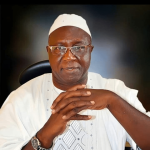The Federal Government has projected to create 1.4 million jobs by resuscitating the cotton/textile industries in the country.
This, according to the Vice President, Kashim Shettima, would be in collaboration with the International Cotton Advisory Committee (ICAC).
According to the VP, the focus was to develop key components of the cotton value chain comprising farming, weaving, ginning and linking of cotton, all in line with the industrialisation drive of the President Bola Tinubu administration.
This was the outcome of a meeting held on Tuesday between Shettima and a delegation from the ICAC led by its Executive Director, Mr Eric Trachtenberg, at the Presidential Villa, Abuja.
Speaking after the remarks from the ICAC delegation and other participants at the meeting, Shettima urged stakeholders to come up with a roadmap for the revitalization of the cotton/textile sector in Nigeria, noting that “it is time to work more and talk less”.
The Vice President assured that the Tinubu administration would make conscious efforts to ensure the country harnessed opportunities in the cotton value chain, including ensuring that Nigeria regained its ICAC membership.
He thanked the delegation for the visit, just as he acknowledged ICAC’s commitment to the development of the sector in Africa, noting that “Your diverse backgrounds in ICAC gives a nuance understanding of the complexities and opportunities in the cotton value chain.”
Earlier in his remarks, Governor Babajide Sanwo-Olu of Lagos said his state was well positioned to harness opportunities in the cotton value chain, given that it hosts the factories, the market and was a critical component of the business ecosystem for the cotton sub-sector.
He said Lagos, as an integral part of the cotton value chain in Nigeria, would support every effort by stakeholders to revamp the sector to enable the state sustain its status as the largest fashion hub in the continent.
The Governor expressed excitement at the possibility and opportunity for the resuscitation of the cotton and textile sector with a particular focus on job creation and economic transformation.
Sanwo-Olu pledged the state’s readiness to offtake cotton produced in other parts of the country for companies based within the area.
On his part, Governor Hope Uzodinma of Imo State said the meeting with the delegation from the ICAC was the beginning of Nigeria’s quest to revamp the textile industry as part of the broad objective for industrialising the economy.
He said Imo State and the Southeastern region would key into the renewed effort to revamp the cotton/textile sector with the bid to create jobs for the people and for the overall industrialization drive of the country.
According to him, “the opportunity created by the meeting is a new beginning in our quest for industrial recovery and creation of jobs for our teeming youths as well as an opportunity for a new partnership.”
In his remarks, Trechtenberg said he was pleased with the level of interest and commitment shown by the leadership of the country and other stakeholders in reviving the industry in Nigeria.
Citing examples in China, India, Pakistan and other parts of the world, the ICAC Executive Director said the potentials in the cotton value chain was huge and had proven to be transformative.
He noted that cotton and textile offered competitive advantage, economic transformation and was a very competitive product that could be sold, both domestically and internationally, with probability to generate high quality jobs for now and in the future.
He said the ICAC would support Nigeria’s cotton value chain revamp by offering expert advise in improving productivity and boosting the value chain and investment facilitation.
Also present at the meeting were the Minister of Innovation, Science and Technology, Chief Uche Nnaji; the Director General, Budget Office, Dr Tanimu Yakubu; Director General, Raw Material Resear








